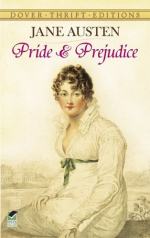|
This section contains 1,881 words (approx. 7 pages at 300 words per page) |

|
Elizabeth's Rebellion in "Pride and Prejudice"
Summary: Jane Austen's "Pride and Prejudice" is sometimes criticized for supported the repressive Victorian patriarchy of her time. But the character of Elizabeth does not accept everything: she goes through stages of protest acceptance, rebellion and conformity.
Jane Austen, a writer in 19th Century England, wrote about what she knew; namely the societal norms of her era and class. In a time where men were given all the status and privileges, she wrote novels predominantly about women, their position in society, and the roles that they played. Since women were not entitled to property, they would often grow up with the goal of finding a suitable husband (Guidelines 1990:1). It is for this reason that people have criticised Jane Austen's writings - saying that she reinforced the norms of patriarchy by reassuring the reader about the order and stability of society. However her novels contain more than this in that her characters often go against the conventional norms of society. This essay will show how the character of Elizabeth in Pride and Prejudice does not just accept everything in society. At various stages in the novel...
|
This section contains 1,881 words (approx. 7 pages at 300 words per page) |

|


